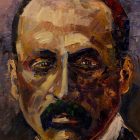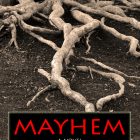The Best Short Story I Read in a Lit Mag This Week: “My Beard” by Eric Braun
There’s a difference between what the narrator views as the story and what the reader views as the story. By playing with that distance, writers can illuminate the deeper desires of their characters, revealed by what they choose to focus on in the telling, and what they don’t. In Eric Braun’s “My Beard,” from Redivider—a journal published by Emerson College, as is Ploughshares—the central story slips out slowly in spite of the narrator’s clear desire to steer the narrative in different direction.
The initial focus of the story, introduced in the title and reinforced by the section titles (My Beard at the Game, My Beard at Work, etc.), is the narrator John Ruiz’s beard. It makes him feel like a “brand new man.” But beneath appearances, Braun sets up a subtext, which questions the simplicity of the narrator’s revelation and enjoyment of the new beard. What was wrong before that the beard fixed? What problems did it solve? Simple fashion choices don’t carry much weight on their own; to give the beard so much focus implies that there’s more below the surface.
Braun supplies some hints in the third section, when Galen—the narrator’s boss at a washer factory—begins prodding John about his previously unmentioned father.
Don’t take this the wrong way, Galen says, but some people are wondering… well, maybe you should get some rest.
I’m not tired.
I mean take some time off. Visit your dad in the hospital. Have you seen him since he fell?
Before the beard, I would have done what Galen said. I would have gone home to my apartment, and I would have visited Dad. Waited for “some people” to tell me what to do. What they think is best for me.
A mystery emerges. For the narrator, the story is still about the beard and this newfound identity he’s grasped; for the reader, it’s beginning to look much more complicated than that. What happened to his father? Why would he find it some sort of personal victory to not visit him in the hospital?
It’s not an easy mystery to solve, especially when the narrator doesn’t necessarily want it to be mentioned in the first place. But why? Ruiz returns to talking about how the beard has changed him, both in dating and in private, and eventually we get the genesis of the beard.
I’ve always kept my face shaved clean and my hair “high and tight,” as they say, which is a military expression, except I’ve never been in the military. Men of my generation are lucky, that’s what my dad says, we’ve grown up in mostly peace times with no draft. We have a volunteer military.
Anyway, we were up there, doing trust-me drills and talking about our obstacles, and some of the guys were letting their beards grow and so did I. When I went into the decrepit little bathroom by the beach, and I saw myself in the cracked piece of mirror hanging on the wall, it was like I was a different person. Imagine looking in the mirror and seeing a stranger. Someone with charisma. Someone who, who knows, might be brave.
Here Braun begins to reveal more about how John Ruiz views himself, and it’s all in contrast to his father, presented not just in terms of appearance—the high-and-tight military look—but also in a certain kind of old school masculine ideals: bravery and charisma. Braun is showing the narrator’s bind. Ruiz finds pleasure when he discovers in the mirror a man who appears visually different than his father, but he also likes it because, ironically, the vision also seems to bring with it potential at inhabiting his father’s ideal.
The narrator wants the story to be about the freedom his rebellion has brought. Braun shows us that, on another level, the story is about how rebellions—even the simple growing of a beard—are often much more about compliance than the participants would like them to appear.
But the story isn’t over. Braun reveals, very subtly, that there’s more than just the desire and inability to follow in his father’s footsteps that causes John to grow a beard and not visit his father. Notice the tragic implications of the last sentence.
I wasn’t going to bring up my dad but since I did already I might as well say: He does not have a beard. My beard is an original. He shaves with a wet razor everyday, twice a day if he goes out to dinner. He wears “the finest” shirts and dress shoes and stands really tall and imperious so everyone will think he’s stately. He said I’m a retard and I don’t know what’s right, and as long as I lived under his roof I had to do what he said, everything, even the stuff I didn’t like, like when he’d just come out of the shower.
I won’t spoil the ending, but suffice it to say that what first appears to be a simple fashion decision, then develops slowly into a rebellion of questionable merit, finally turns into story of hope and defiance in the face of abuse. This morphing occurs through Braun’s subtle layering of complexities, making the reader draw early conclusions about the mystery, only to subvert them once again as the next section brings with it another layer. By the end, we understand why Ruiz was so focused on his beard. I’d hazard to guess that growing it, and then talking about it, might have rivaled any bravery his father showed on the battlefield.



